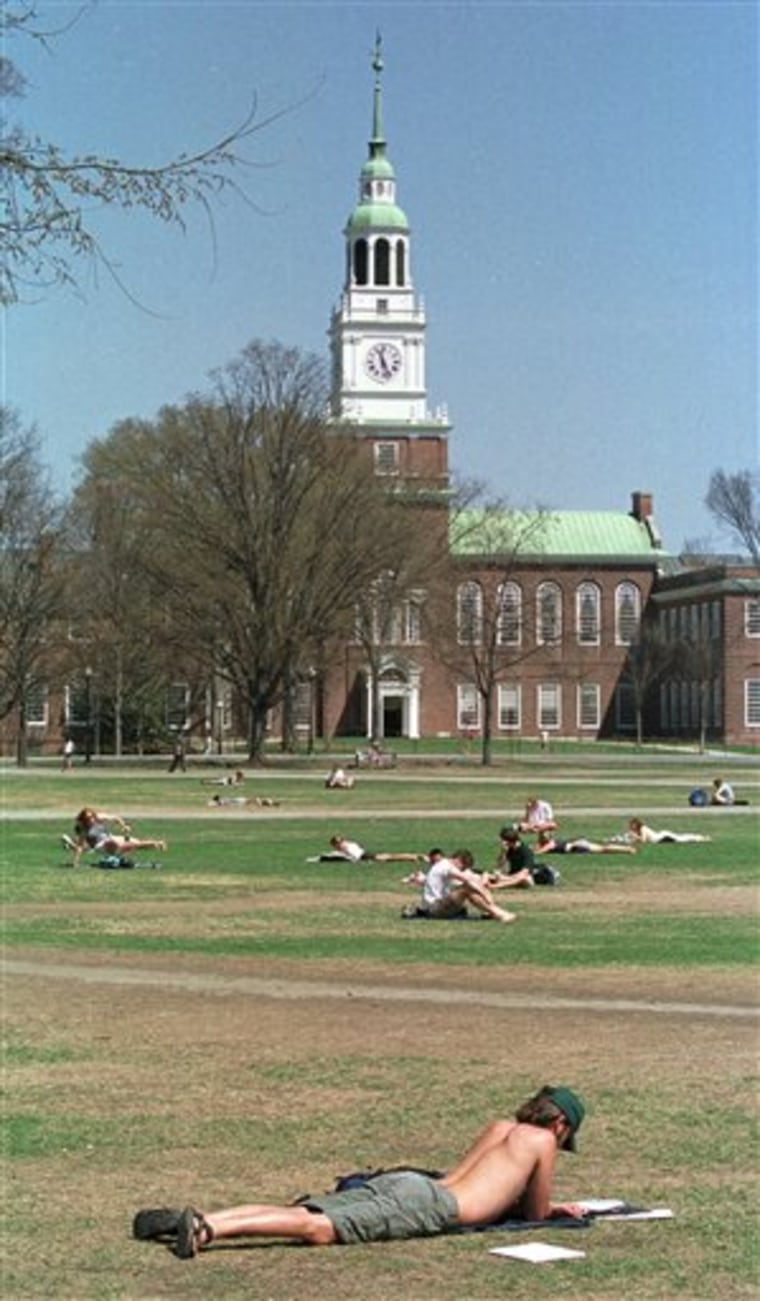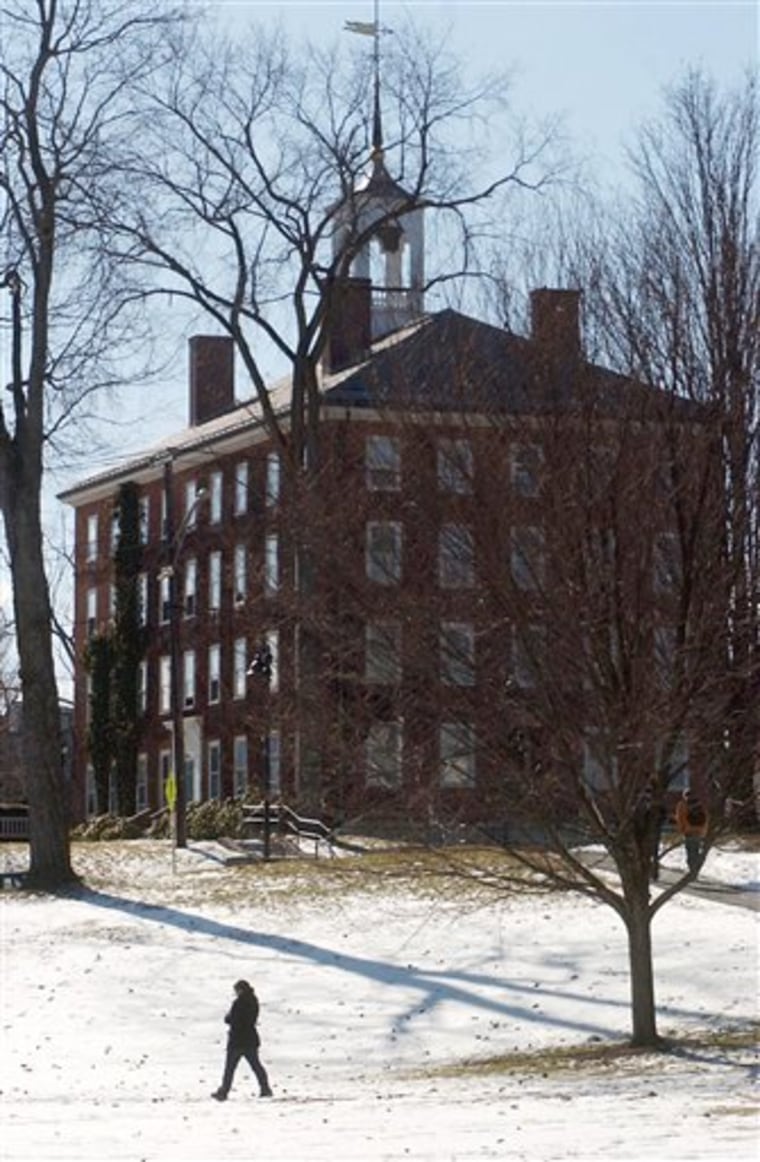In the last year, the nation's private colleges have laid off staff, shelved construction projects, slashed sports teams and turned down thermostats to cut costs. But student financial aid has kept flowing.
Now the weak economy is forcing some institutions to limit their generosity after many of them doubled or even tripled financial aid over the last decade to attract more applicants and reduce student debt.
Two of the nation's most selective private colleges — Dartmouth and Williams — announced they would no longer offer aid packages that allow students of any income to attend without taking out loans. Other schools are expected to follow suit, meaning many middle-class students will have to take on more debt.
Situations vary depending on the school, but experts expect financial aid at private schools to be less generous than last year while colleges increase tuition by 4 to 6 percent.
‘Went a little overboard’
Many colleges dipped into savings last year to substantially increase student aid out of concern their enrollments would plunge because of the economic downturn — fears that went unrealized at most schools.
"There's a bit of a feeling that in increasing aid, maybe colleges went a little overboard because there was a lot of panic a year ago," said Roland King, vice president of public affairs for the National Association of Independent Colleges and Universities. "I think it's going to be a more austere year."
On Monday, Dartmouth College in Hanover, N.H., became the latest prestigious private institution to announce sweeping cutbacks in the wake of the recession. The Ivy League school said it will lay off about 76 staff as part of a plan to close a projected $100 million budget gap.
The Dartmouth board also approved a 4.6 percent increase in undergraduate tuition, room and board, and fees, raising the annual tab to $52,275 — the smallest increase in the past five years, officials said.
The school said it would increase its financial aid budget 10 percent to help offset the tuition increase. But one big part of the aid program will be cut: The plan to offer loan-free financial aid for students of all income levels beginning with the class entering in fall 2011.
"The simple reality is that we just can't afford that anymore," said Dartmouth President Jim Yong Kim.
Loans replaced with grants, scholarships
Between 30 and 40 schools, most of them private, replaced loans with grants or scholarships for students on financial aid in recent years. But that was when college endowments were posting record gains. Dartmouth's endowment lost 23 percent of its value last fiscal year, falling to $2.8 billion.
Over the weekend, the Dartmouth board voted to reinstate loans of $2,500 to $5,500 per academic year for financial aid recipients from families with incomes above $75,000. Students from families that earn less will continue to receive free tuition and loan-free aid packages.

The move comes a week after Williams College, a private liberal arts school in Williamstown, Mass., became the first school to announce it would rescind a no-loans policy, starting in fall 2011. Williams has said the neediest students will not be required to take out any loans, but it has not announced details.
"Our financial aid program will continue to be one of the most generous anywhere, as it should be, and we are convinced that Williams will remain financially attractive to aided students at all levels of income," interim President Bill Wagner wrote in a Jan. 31 letter.
Other elite private schools are sticking with their no-loan policies, at least for now. Among them is Amherst College, which has doubled its low-income student enrollment in recent years, in part through more transfers from community colleges and more international students.
"But we also have to remain accessible to the middle class, where we had under-representation and where there is so much talent," Amherst President Anthony Marx said. "Maintaining a no-loan policy seems to help us make Amherst more accessible to the middle class and also eliminate the constraints of debt on those students' career choices."
Amherst is asking students on financial aid to contribute more of their summer earnings to their education — a step that's anticipated at Swarthmore College and other schools.
Most private schools, however, can only dream of being as wealthy as Amherst, one of 54 colleges and universities in the U.S. with endowments of more than $1 billion.
Schools facing greater financial difficulties might engage in "leveraging" — sweetening the pot for students who can pay a larger chunk of their tuition in a bid to influence enrollments and improve their bottom lines, said Mark Kantrowitz, a financial aid expert and publisher of the FinAid and FastWeb web sites.
‘A real danger’
Lauren Asher, president of the Berkeley, Calif.-based Institute for College Access and Success voiced a similar concern.
"If you have to cut back — and that's a big if — then focusing your available resources on those who need it the most is the right way to go," she said. "However, some colleges may take this economic crisis as license to spend more on students with less need to attract students who are paying a larger share of their tuition dollars ... That's a real danger."
Few people pay the full sticker price at private schools, she said, and it's a positive development that some schools are becoming more transparent about how much students are expected to borrow.
Most private schools are in the process of setting their budgets for the next fiscal year and have yet to announce details on tuition and student aid projections. Some plan to offer more financial aid, in part because they plan to admit more students or raise tuition.
Rice University in Houston plans a modest tuition increase and an increase to need-based financial aid. Rice President David Leebron said the school remains committed to a financial aid package that includes eliminating loans for families with incomes of less than $80,000, and capping total loans for four years of college at $10,000.
"It's a challenging time," Leebron said. "For us, at least, it's so fundamental to who we are that we remain attractive to middle- and lower-income students, we don't contemplate major changes."
Other colleges are looking to hold the line on aid. Colorado College's endowment declined by 19 percent last year to $400 million, leading to staff cuts and elimination of the football program.
Colorado College President Richard Celeste said the liberal arts school in Colorado Springs plans an "extremely modest tuition increase" and a financial aid increase to match. But beyond that, the college will not expand aid except for setting aside extra money for existing students in financial straits, he said.
"What we want to count on for our students and our families is a stable outlook for financial aid," Celeste said. "Obviously, I'd very much like to increase it, but I need to have the money first."
